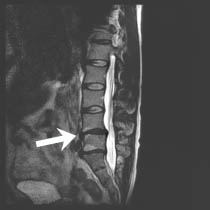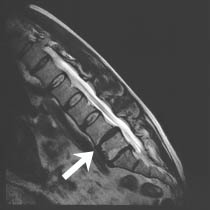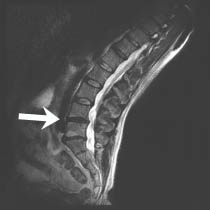Spondylolisthesis
shown
to require additional
fusion segment
once its degree of instability,
not visible by
recumbent-only MRI,
was demonstrated
by Fonar Upright MRI
Clinical Case Overview
The patient was a 49-year-old male who had had a 20-year history
of chronic back pain and a three-year history of right lower
extremity radiculopathy.
Prior to the Upright™ scan, the
patient was scanned in a recumbent-only MRI (1.5T). It showed
a right paracentral disk herniation at L5-S1. Based on the
recumbent images, neurosurgeon Bennie W. Chiles III, M.D.,
said:

Neutral-Sit

Flexion

Extension
“I would have likely performed
a diskectomy at L5-S1 to relieve pressure on the nerve root,
along with an L5-S1 fusion for the back pain. Fusing L4-5
was not an initial consideration because no spinal instability
was seen on the recumbent MRI.
When the dynamic flexion and extension
images performed in the Upright™ MRI demonstrated an
instability at L4-5 and showed the full extent of that instability
once the patient’s body weight was applied, I chose
to also fuse L4-5 during the procedure rather than treat L5-S1
alone.
The result was a better outcome for
the patient whose severe right leg pain is now gone and whose
back pain is much reduced.”
Bennie W.
Chiles III, M.D., F.A.C.S.
Westchester Spine and Brain Surgery, PLLC
Hartsdale, New York,
Upright Imaging of Westchester, P.C.
Yonkers, New York
close
this window
|
